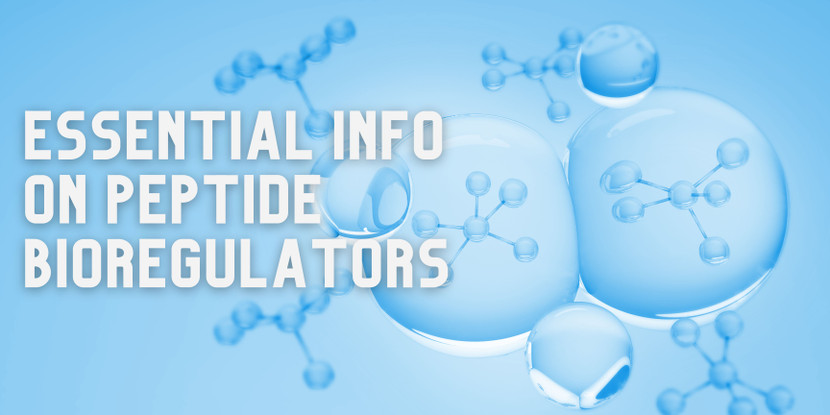Essential Information on Peptide Bioregulators
How do peptides work?
Peptide bioregulators have been gaining attention in the field of rejuvenation and wellness due to their potential in improving bodily functions. These small protein molecules are found naturally in the body and play essential roles in regulating various physiological processes. Recently, synthetic versions of these peptides have been developed to augment their natural effects. In this blog post, we will explore the science behind peptide bioregulators, the difference between synthesized and natural peptides, and their potential uses.
Peptides are small chains of amino acids that are linked together by peptide bonds. They are naturally occurring molecules found throughout the body, performing a variety of functions ranging from hormone production to immune system regulation. Peptide bioregulators are specific peptides that are involved in the regulation of gene expression. These peptides interact with DNA, acting as molecular switches that turn genes on or off. By doing so, they help to regulate protein synthesis and the overall function of cells and tissues.
Synthetic peptides are designed to mimic the structure and function of natural peptides, with the intention of augmenting or enhancing their natural effects. Synthetic peptides can be produced more efficiently and in larger quantities than natural peptides. However, they may not always have the same potency as their natural counterparts.
Peptide bioregulators can be used for a variety of purposes. They have been shown to have rejuvenation effects by improving cellular function and promoting tissue regeneration. Peptides can also be used to improve athletic performance by increasing muscle mass, strength, and endurance. Some peptides have been studied for their potential in treating neurodegenerative diseases, such as Alzheimer's and Parkinson's, by promoting neuronal survival and reducing inflammation.
Peptide bioregulators work by interacting with specific genes and proteins in the body. They bind to receptors on the surface of cells, initiating a cascade of cellular signaling events that result in changes in gene expression and protein synthesis. These changes can have a wide range of effects, depending on the specific peptide and the cells or tissues involved.
Essential facts:
- A peptide bioregulator is a short chain of amino acids, identified by the fact that it is shorter than a protein, and so can be absorbed easily via the digestive system.
- Each organ or bodily function has its own unique peptide bioregulator.
- Natural peptide bioregulators is a group of peptides of less than 50 amino acids and with a molecular mass of less than 5 kDa, free from foreign DNA or protein substance.
- Natural peptides' effects continue to grow even after finishing the supplementation course and lasts up to 4-6 months until the peptide-protein cycle is impaired again, yet the affects appear later in the use.
- Synthesized peptides have an immediate impact compared to natural peptides and have a faster, yet more short-lived effect of 1.5-2 months.
- Sublingual peptides are absorbed directly through the mucous membrane of the mouth, which promotes faster penetration of peptides and accelerates their action.
- Synthesized peptides are typically used to start. However, it is advised to switch to natural peptides as a follow-up course.
- People can take 5 peptide bioregulators or less at the same time.
- For better absorption, peptide bioregulators should be taken 30 minutes before meals.
Have a specific bodily function that you want to focus on? Then you might find the table below extremely useful!
On our website you can find bundles described above for your convenience: Synthesized Peptide Bundle, Natural Peptide Bundle.
Not sure how to use these products?
Capsules: The general recommendation is to take 1-2 capsules daily durning a meal (30 minutes before for best absorption) and the course can last 10 days to a month. Depending on how you're feeling and personal preference, you can continue the course further or take a break.
Sublingual: Adults take under the tongue 5–6 drops (0.25–0.35 ml) for 10–15 minutes before eating 3–4 times a day. The duration of the intake is 1 month. It is recommended to repeat the intake in 3–6 months.
It is recommended to take a break if you are switching to a different complex or peptide.
Summing Up
Above you can find detailed information about the science behind peptide bioregulators, essential facts, guide through different peptides and recommendations on how to use them. In short, peptide bioregulators are small protein molecules are found naturally in the body and play essential roles in regulating various physiological processes. It is recommended to start with synthetic peptides and then switch to natural peptides after one course. One can take up to 5 peptides at the same time.
Recent Posts
-
New Arrival - Prime Peptides: A New Era In Nutriceuticals
A new peptide product line is now available on Vita Stream. The PRIME PEPTIDE® product line features …Sep 12th 2025 -
World's First "Master Gland" Peptide: A Deep Dive Into Endocron - The Pituitary Peptide
Endocron is a relatively new peptide bioregulator introduced in the Vita Peptides product line, whic …May 19th 2025 -
7 Innovative Approaches to Pain Management That Don’t Require Medication
In the quest for effective pain management, many individuals are seeking alternatives to traditional …Feb 12th 2025




